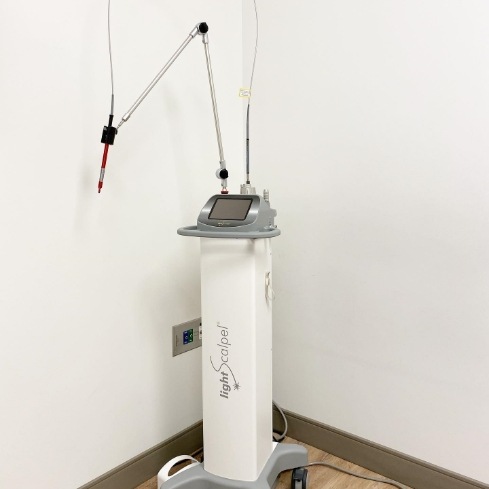Lip & Tongue-Tie Solutions – Chicago, IL
Fast & Gentle Care for All Ages
Every year, thousands of babies are born with lip and tongue-ties, and this ends up making life a lot harder for both them and their parents (especially breastfeeding mothers). These conditions can also cause problems for teens and adults if they weren’t diagnosed early. Thankfully, at Chicago Tongue-Tie Center, our experts know how to quickly find and make these issues go away, all while prioritizing a patient’s comfort. To learn a little more about lip and tongue-tie solutions in our Chicago, IL lip and Tongue-Tie center and how our experts take care of them, read on below.
Why Choose Chicago Tongue-Tie Center for Lip & Tongue-Tie Solutions?
- Team Consisting of Multiple Certified Pediatric Dentists
- All Frenectomies Performed Using LightScalpel
- Able to Work with Pediatricians/Lactation Consultants
What is a Lip-Tie?

Each of the lips is connected to the gums by a small band of tissue called a frenulum or frenum. During gestation, this tissue gradually loosens, allowing the lips to move freely. Sometimes, however, the frenulums (most often the one attached to the top lip) can end up being too short or thick, restricting the lips, which can make it more difficult for someone to eat, speak, and breathe normally.
What is a Tongue-Tie?

Your tongue is connected to the floor of your mouth by a thin piece of tissue. When this tissue is too short or thick, it can restrict the tongue’s ability to move. This can make it much harder and very uncomfortable for someone to eat and speak, plus it can lead to breathing problems during sleep. As a result, issues not normally associated with the tongue can occur, such as digestion difficulties and chronic fatigue during the day.
Symptoms of Lip & Tongue-Tie

Often, lip and tongue-ties make themselves known very quickly because the first thing that many parents notice is that their baby is unable to feed. This is because latching onto a bottle/nipple is painful, plus they are anatomically incapable of creating much suction. Issues seen in older children include speech impediments, sleep-breathing disorders, and a large gap between the upper front teeth.
Learn About Symptoms of Lip & Tongue-Tie
What is a Frenectomy?

A frenectomy is a short, minor surgical procedure that is used to correct a lip or Tongue-Tie. After the patient has been examined and diagnosed, one of our dentists will use a sophisticated laser to loosen or remove the tissue that is causing the problem. All in all, it takes about five minutes, and thanks to our team's expertise and the accuracy of the lasers, even the youngest patient can easily remain comfortable throughout the process.
Benefits & Results of a Frenectomy

Our team will typically recommend a frenectomy when it is determined that a child’s lip or tongue-tie is affecting their health, whether this means it is preventing them from feeding, causing speech issues, or affecting their oral development. In addition to talking to parents, teens, and adults directly, our team also works closely with a network of pediatricians and lactation consultants when deciding the necessity of treatment.
Learn About Benefits & Results of a Frenectomy
LightScalpel Laser Frenectomy

For all of our frenectomies, the Chicago Tongue-Tie Center only uses the most advanced laser available today, the LightScalpel. Even compared to other lasers, it can complete the procedure while keeping a patient much more comfortable and greatly minimize any bleeding or swelling. It is essentially the “Maserati” of dental lasers, and we invested in this technology because we believe our patients deserve the best care possible.
Learn About LightScalpel Laser Frenectomy
Laser Frenectomy Aftercare

Once a frenectomy has been performed, it’s very important for a patient to follow a prescribed aftercare routine in order to guarantee a smooth recovery. We will give the patient or their parents a list of stretches to perform to make sure the lip or tongue-tie doesn’t come back. These will also help the patient relearn how to use their lips/tongue now that they have more freedom.
Learn About Laser Frenectomy Aftercare
Frenectomy FAQs

Even if you understand the benefits and positive outcomes a frenectomy procedure can offer your child, you may still have questions about it. You should never hesitate to ask us if you are unsure about any part of the frenectomy process. For your convenience, we’ve addressed some concerns in the responses below in hopes that it will bring you peace of mind and help you take the next step and schedule a consultation with us.
Will My Baby Need a Local Anesthetic?
In most cases, we are able to perform the frenectomy without having to administer any kind of
anesthesia, including a local anesthetic. If we find that it may be necessary, we will give it to your child
to reduce their discomfort during the short procedure.
When Should We See Improvement in Nursing and Other Oral Functions?
Your baby’s recovery should be quick. Sometimes, there is immediate improvement with breastfeeding. Most times, it takes a few tries or even a few days before you will notice improvements in breastfeeding. You may need to work with your lactation consultant or a pediatric therapist to help your child learn the proper nursing technique after the frenectomy procedure. If your child is older and talking, you will want to work with a speech therapist to help them learn how to form sounds with their newly untied tongue.
Is a Frenectomy Covered by Insurance?
Depending on your policy and benefits, a frenectomy procedure is likely covered either by your dental or medical plan. You may have a co-pay or certain amount that you’re responsible for, but you may not have to pay the entire cost out-of-pocket. Regardless of your situation, our team is ready to work with you to find a financial solution that meets your needs and fits your budget.
What Kinds of Exercises or Stretches Will We Need to Do After the Frenectomy?
We ask parents to do oral stretches on their baby every time they feed their baby after they’ve had a frenectomy to prevent the tissue from reattaching. These only take a minute or two to complete. We will give you these instructions before you leave and will demonstrate them as well.
Is My Baby Too Young to Have a Frenectomy?
An infant can undergo a frenectomy at as young as a few days old. When we meet with you and your baby for a consultation, we can talk about timing the procedure with their safety as our first priority.

